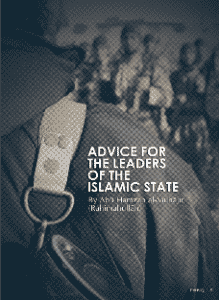No doubt many of you have been looking toward 2018 lately, adjusting your strategy and plans to make it a(nother) successful year. Whatever methodology you use, researching what the competition is doing is critical. What many organizations miss, however, is how the competition’s leadership is contributing to their success.
I think that’s a blind spot that causes us to underestimate the opposition, brought on by our overconfidence in our own leadership acumen.
The other day, I ran across an old document in my archives – a sort of leadership manual from an organization that arguably has had some success in the last several years – and I compared some of the tips to what we espouse. These aren’t exact quotes, but even in paraphrasing, you’ll get the idea.

Seek consultation, hold discussions, and beware of only consulting only a person who always agrees. When leaders ignore the counsel of others, it’s a recipe for disaster. Often, the best ideas for innovation and addressing a process problem come from those who are closest to it. Make them part of the solution, and their buy-in to the solution will be more powerful than you think.
Don’t let your desire to get something cause you to get it by breaking the law. Sound like familiar behavior? The news is full of leaders who think they’re above the rules. Think Enron, Volkswagen, WorldCom, and Bernie Madoff. When an organization’s leadership shows a lack of integrity, it doesn’t just affect the guilty party. It can be crippling to the entire organization.
There’s nothing more demoralizing than a leader who’s lost touch with his followers. I’m not a big fan of the whine “senior leadership is out of touch,” but sometimes leaders insulate themselves – intentionally or unintentionally – and their team loses trust that their leader cares. I was never motivated to do something for someone who I thought were only in it for themselves.

Don’t be complacent when things are going well. Resting on your laurels is the quickest way to get run over. As a leader, you have to celebrate your team’s successes while keeping an eye out for what’s going to go wrong next. Plenty of big box stores have fallen by the wayside under complacent leadership.
Reward those who perform well; be generous and recognize them publicly. Your workforce, regardless of which generation they’re part of, wants to feel valued for doing worthy work. What makes them feel valued differs (ask them), but failure to make your best performers feel valued will drive them to be top performers in another company.
Be fair, honest and genuine with those you lead. Most of us have witnessed or experienced toxic leadership first hand, and we know how it makes people feel. Why in the world would we be anything but fair, honest and genuine with those we lead (and everyone else we work with, for that matter)? And yet…

How does this apply to us in the corporate world? Rhetorical question, sorry. If you don’t get the parallels, you should probably stop reading.
But these are some of the basic building blocks of leadership, and they haven’t changed in a couple thousand years (you’ve heard that here before). Don’t ever believe you’re the only one who “gets it” or you’ll be run over by the competition.
And these skills aren’t learned in an academic environment. They are either modeled by the kind of leaders people want to follow and taught in real-life situations, or their absence speaks volumes to those top performers who won’t tolerate being treated otherwise. Leadership development that isn’t rooted in hands-on senior leadership participation won’t deliver the return on investment that you hope it will.
Effective leadership in our U.S. military isn’t hypothetical; men and women are put in positions of authority, and their leadership successes and failures can save or lose lives. There is no role playing, and it isn’t a three-day offsite kumbaya. And yet our military teaches the some of the same leadership skills that the world’s most dangerous terrorist organization teaches.
Your competition may not be a terrorist, but don’t assume your leadership skills give you a competitive edge. Leaders at every level need continuing development every bit as much as most licensed professionals need continuing education. Think about that while you make your plans for 2018. Leave leadership development out at your own peril.

